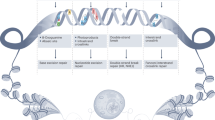Abstract
Damage to DNA by oxygen free radicals is postulated to cause mutations that are associated to the initiation and/or the progression of human cancers (Breimer, 1990). Oxidative damage-induced mutations can activate oncogenes or inactivate tumor suppressor genes altering the cell growth control (Fearon, 1997). An oxidatively damaged guanine, 7,8-dihydro-8-oxoguanine (8-OxoG) is abundantly produced in DNA as a consequence of the cellular oxidative metabolism, exposure to ionizing radiation or chemical carcinogens. The presence of 8-OxoG in DNA has been shown to be mutagenic since it preferentially pairs to adenine during in vitro DNA synthesis (Shibutani et al., 1991) and generates a mutator phenotype characterized by a high frequency of G:C to T:A transversions (reviewed in Boiteux et al. (Boiteux and Radicella, 2000). In mammalian cells, the OGG1 gene codes for an 8-OxoG DNA glycosylase/AP lyase that has the capacity to excise this oxidized guanine from DNA. Mice lacking a functional Oggl protein accumulate abnormal levels of 8-OxoG in their genomes and display a moderately elevated spontaneous mutation rate in nonproliferative tissues. Since the inactivation of the OGG1 gene in mammalian cells causes a mutator phenotype, it can be expected that cells lacking the Oggl activity could have enhanced probability to undergo cancer transformation (Loeb, 1991). The validation of this hypothesis requires the identification of human tumors where both alleles of the OGG1 are non functional.
Access this chapter
Tax calculation will be finalised at checkout
Purchases are for personal use only
Preview
Unable to display preview. Download preview PDF.
Similar content being viewed by others
References
Audebert M., Radicella J. P., and Dizdaroglu M. (2000). Nucleic Acids Res. (in press).
Boiteux S., and Radicella J. P. (2000). The human OGG1 gene: structure, functions, and its implication in the process of carcinogenesis. Arch Biochem Biophys 377 1–8.
Breimer, L. H. (1990). Molecular mechanisms of oxygen radical carcinogenesis and mutagenesis: the role of DNA base damage. Mol Carcinog. 3: 188–97.
Fearon, E. R. (1997). Human cancer syndromes: clues to the origin and nature of cancer, Science. 278: 1043–50.
Hollstein, M., Shomer, B., Greenblatt, M., Soussi, T., Hovig, E., Montesano, R., and Harris, C. C. (1996). Somatic point mutations in the p53 gene of human tumors and cell lines: updated compilation, Nucleic Acids Res. 24: 141–6.
Loeb, L. A. (1991). Mutator phenotype may be required for multistage carcinogenesis. Cancer Res. 51: 3075–3079.
Shibutani, S., Takeshita, M., and Grollman, A. P. (1991). Insertion of specific bases during DNA synthesis past the oxidation-damaged base 8-oxodG. Nature. 349: 431–4.
Author information
Authors and Affiliations
Editor information
Editors and Affiliations
Rights and permissions
Copyright information
© 2001 Springer Science+Business Media New York
About this chapter
Cite this chapter
Audebert, M., Levalois, C., Chevillard, S., Dizdaroglu, M., Boiteux, S., Radicella, J.P. (2001). hOGG1 Gene Alterations in Human Clear Cell Carcinomas of The Kidney: Effect of Single Mutations in hOGG1 Gene on Substrate Specificity of The hOgg1 Protein. In: Dansette, P.M., et al. Biological Reactive Intermediates VI. Advances in Experimental Medicine and Biology, vol 500. Springer, Boston, MA. https://doi.org/10.1007/978-1-4615-0667-6_91
Download citation
DOI: https://doi.org/10.1007/978-1-4615-0667-6_91
Publisher Name: Springer, Boston, MA
Print ISBN: 978-1-4613-5185-6
Online ISBN: 978-1-4615-0667-6
eBook Packages: Springer Book Archive




